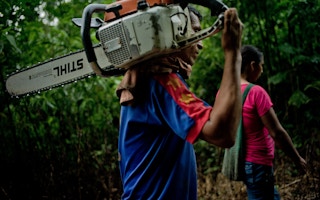Pledges to slash climate-changing emissions to nearly zero now cover more than 90 per cent of the world’s economy. But emissions themselves are still rising, despite scientists warning they must plunge by nearly half this decade to keep people safe.
Dealing with climate change through voluntary commitments, especially by businesses, “has simply not worked”, noted Arianne Griffith, a lawyer and corporate accountability expert with advocacy group Global Witness.
New transparency and accountability mechanisms are needed to ensure that corporations and governments meet their promises on climate action, she and others said this week at the Skoll World Forum, an expert gathering focused on solving global problems.
Griffith said those measures could include things like a European Union Corporate Sustainability Due Diligence Directive (CSDDD) - which Global Witness and its partners have pushed for since 2019 in Brussels, despite corporate opposition.
The directive would require firms to track and show how their businesses, and the products and services they produce, align with the Paris Agreement on climate change - or face civil lawsuits for the climate and human rights damage they cause.
“The idea is to create a credible threat of legal action for the companies that are threatening all of us with persistent inaction,” Griffith said.
So far such legal pressure remains relatively rare, despite what experts described as widespread “greenwashing” by companies that make pledges - often for commercial gain - with few credible plans to meet them.
“We’re in a tough spot when it comes to transparency and accountability,” said Gillian Caldwell, chief climate officer for the US Agency for International Development.
“
We need to tackle what I call the ‘greenwashing machine’, that is so often accompanied by total inaction.
Arianne Griffith, corporate accountability expert, Global Witness
Among national governments, Colombia is the only country that has enshrined in law its climate action plan developed under the Paris Agreement, giving the plan some level of enforceability, she noted.
Beyond that, governments are held to their climate commitments only by public opinion or pressure from countries they team up with in trade or other partnerships, she said.
“In most cases, there really is no accountability,” Caldwell added.
She and other experts said genuinely reducing emissions in line with what scientists say is needed would require stronger steps, from new legal liability for climate harm to ensuring businesses that make net-zero claims cut their own emissions rather than just purchasing carbon offsets.
Curbing deforestation
In Brazil - the world’s fifth biggest carbon polluter, largely due to loss of its forests - efforts to crack down on illegal deforestation are emerging using satellite data.
MapBiomas, a Brazilian non-profit, uses satellite maps that break the country into 9.6 billion parcels - each 30 by 30 metres (98 ft) - to show in fine detail where deforestation and other changes in land use are happening.
It then works with state governments, prosecutors and even the state-controlled Banco do Brasil to flag illegal land clearance and hold the culprits to account with consequences including fines, lawsuits and loan refusals.
Because banks provide about 80 per cent of the money needed to convert deforested land into cattle ranches or soy farms, choking off finance is an effective way to curb illegal activity, said Tasso Azevedo, MapBiomas founder and general coordinator.
The satellite mapping is also helping hold Brazil to account on its pledge to restore 12 million hectares (29.7 million acres) of degraded land, he said.
While the satellite maps show that 46 million hectares are in some state of regeneration, they also reveal that many replanted areas are rapidly being cleared again, which suggests that tracking tree-planting is no real measure of improvement.
By combining satellite maps with local knowledge, “our job is to tell the story” of each piece of land, Azevedo said.
MapBiomas is now expanding its work to Indonesia, another country struggling to lower forest loss, with plans for further expansion in the tropics, he added.
Role for communities
In many cases, communities can play a key role in holding governments to account, said Sonkita Conteh, a lawyer in Sierra Leone and co-founder of Namati, an organisation that uses legal networks to advance social and environmental justice.
Last year, Sierra Leone passed a customary land rights act that gives communities greater power over their collectively held land, making it harder for authorities to hand it out to loggers and other corporations.
Now if the government wants land to give to investors, it needs to gain consent from local people - a measure that should help cut runaway deforestation, Conteh said.
Griffith, of Global Witness, said new and more substantial consequences are required, to incentivise those who make green pledges to keep them.
“We need to tackle what I call the ‘greenwashing machine’, that is so often accompanied by total inaction,” she said.
This story was published with permission from Thomson Reuters Foundation, the charitable arm of Thomson Reuters, that covers humanitarian news, climate change, resilience, women’s rights, trafficking and property rights. Visit https://www.context.news/.

















